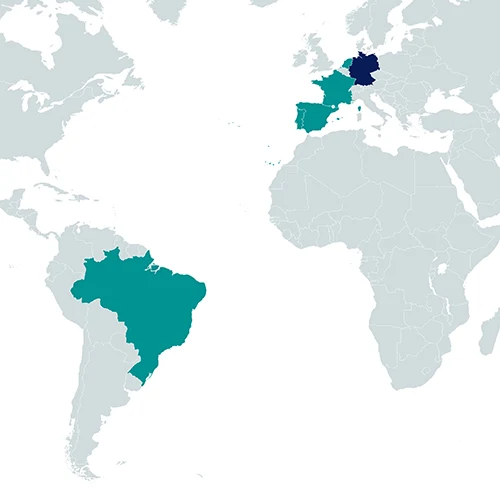2023-04-01 to 2026-03-31
Approx. 1,2 mil. EUR
Dr. Jean Carlo Rodríguez de Francisco
-
Environmental Governance and Transformation to Sustainability, German Institute of Development and Sustainability, Bonn, Germany
-
Engineering, Modeling and Applied Social Science Center, Federal University of ABC, Santo André, Brazil
-
Danone WATERS / Water Institute by Evian, SAEME -DANONE group, Evian-les-Bains, France
-
Water, Environment, Process Development and Analysis Division – New Water Resources and Economics Unit, French Geological Survey (BRGM), Montpellier, France
-
Centre for Applied Ecology – School of Agriculture, University of Lisbon, Lisbon, Portugal
-
Department of Conservation and Policy, Nature Portugal Association / WWF, Lisbon, Portugal
-
Department of Sociology and Anthropology, University of La Laguna, San Cristóbal de La Laguna, Spain
-
Water Resources Management Group, Environmental Sciences, Wageningen University, Wageningen, The Netherlands

Nature-based Solutions (NbS) have gained a reputation as win-win solutions, capable of achieving societal as well as environmental benefits simultaneously. Therefore, they are increasingly included in the design and implementation of water-secure, resilient cities in the context of growing urbanization, biodiversity loss, and accelerated climate change. However, the effectiveness of NbS in delivering ecosystem services related to water provisioning and in promoting biodiversity conservation in a manner that is socially just remains contested. Critics have shown that NbS can, instead, generate adverse effects by creating or exacerbating existing social inequalities. These negative impacts can limit the societal acceptance of NbS and affect their implementation, long-term sustainability, and upscaling potential. To understand under which conditions NbS can fulfil their promise to promote environmental and social-economic outcomes simultaneously, it is essential to know how (in)justices are created in the design, implementation, and evaluation phases of NbS. Doing so requires a calculation of net benefits, an assessment of how social-economic and social-environmental benefits and costs are allocated across social groups, how decisions on NbS are made and by whom, and how these factors influence environmental conflicts.
Therefore, BIO-JUST investigates NbS for watershed provisioning ecosystem services from an environmental justice point of view, looking at the dimensions of distribution, participation and recognition. It does so in seven different case studies in Europe (France, Portugal, Spain and The Netherlands) and South America (Brazil, Colombia and Ecuador) to allow for comparisons across cases and to promote mutual learning. BIO-JUST draws on multiple disciplines and approaches (i.e., environmental justice, political ecology, environmental anthropology, critical institutional analysis, and ecological economics) to identify under which conditions NbS generate or reinforce inequalities and conflicts, and under which they promote socially just outcomes while conserving biodiversity and supporting water security.
BIO-JUST will assess the social-economic and social-environmental outcomes of NbS for watershed provisioning of ecosystem services, and identify trade-offs between them. It will assess the distribution of costs and benefits across societal groups, and look at the extent to which different stakeholders, forms of knowledge and worldviews, and use rights are included in decision-making, implementation, and evaluation processes for NbS. It will compare the different institutional frameworks and social and biophysical contexts to identify those that are conducive to NbS that are ecologically beneficial and socially just. To do so, the project will conduct a qualitative comparative analysis (QCA) and draw on approaches such as institutional analysis, ecological economics, and visual ethnography, working closely with stakeholders from the respective case studies. Together with these stakeholders, indicators for “effective”, i.e. ecologically beneficial and socially just, NbS will be developed in a co-design process. BIO-JUST’s commitment to transdisciplinarity facilitates dialogue between community members and decision-makers, creating learning opportunities and establishing landing places for its case study-specific recommendations.